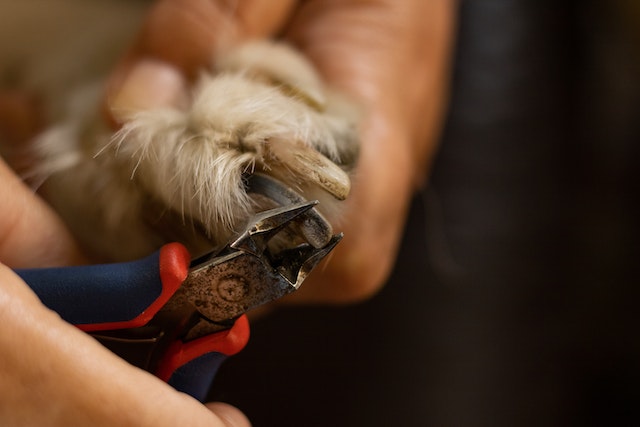9 Signs of Shih Tzu Separation Anxiety [Causes & Tips]
![9 Signs of Shih Tzu Separation Anxiety [Causes & Tips] Shih Tzu Separation Anxiety](https://petcreeks.com/wp-content/uploads/2023/04/Shih-Tzu-Separation-Anxiety.jpg)
Does your furry little friend whine, bark, and destroy things when you’re not around? If so, your dog might be struggling with separation anxiety.
But don’t worry – you’re not alone!
Separation anxiety is a common problem among Shih Tzus and other breeds, and there are plenty of things you can do to help your dog feel more comfortable when you’re away.
In this blog post, we’ll discuss some of the causes of separation anxiety in Shih Tzus and provide tips on how to prevent and treat it.
What is Shih Tzu Separation Anxiety
Shih Tzu separation anxiety is a condition characterized by extreme distress and anxious behavior exhibited by a Shih Tzu dog when separated from its owner or other family members.
Symptoms of separation anxiety in Shih Tzus may include excessive barking, howling, or whining, destructive behavior such as chewing or digging, urinating or defecating indoors when left alone, and overall anxious or distressed behavior.
If left untreated, separation anxiety can negatively impact a Shih Tzu’s quality of life and may also cause stress and disruption for its owners.
Symptoms of Separation Anxiety in Shih Tzus
Here are some common symptoms of separation anxiety in Shih Tzus:
1. Excessive excitement upon your return
One of the common signs of separation anxiety in Shih Tzu is excessive excitement upon your return.
Your Shih Tzu may become overly eager and hyperactive when you leave them alone and come home.
Since the dog is happy to see you again and may be attempting to make up for a missed time, this behavior may be an indication of separation anxiety.
Even though this behavior might be cute, it can also be overwhelming and can trigger unwelcome actions like jumping or barking.
2. Attempts to escape when left alone
Another common sign of separation anxiety in Shih Tzu is that they constantly attempt to escape when left alone.
When they are confined to a cage, a room, or even the entire house, some Shih Tzu with separation anxiety may attempt to break free.
They might chew through barriers or dig under fences, or they might scrape at doors or windows.
This activity can be risky and lead to the Shih Tzu getting hurt, your property getting damaged, or even escaping your property.
3. Excessive barking or whining when left alone
The inherent desire of a Shih Tzu to remain with its pack, in this case, its owner or family, can be triggered by separation anxiety.
The dog may become too noisy, such as by barking or whimpering, when left alone since they may feel threatened or abandoned.
If you live in an apartment or have close neighbors who might be upset by the noise, this behavior can be very troublesome.
4. Destructive behavior when left alone
Shih Tzus who experience separation anxiety may engage in destructive activity as a coping mechanism.
They might tear holes in carpets or flooring, chew on furniture, walls, or door frames, or scrape those surfaces.
Some Shih Tzus would even attempt to break free of their crates or rooms, risking harm to themselves in the process.
5. Following you around when you want to leave
Clingy and following you around the house, even to the point of stepping on you, are behaviors that Shih Tzus with separation anxiety may exhibit.
When you leave their sight, they could act nervous or upset and even try to obstruct your way out or stop you from leaving.
6. Accidents inside the house when left alone
Even if they are housebroken, Shih Tzus with separation anxiety may urinate or defecate within the home when left alone.
This behavior, which may also include panting or drooling, might be an indication of acute stress and anxiety.
7. Loss their appetite or refuse to eat altogether
Shih Tzus that are going through separation anxiety may reduce their appetite or stop eating completely.
If not treated right away, this could be an indication of anxiety and sadness and could result in weight loss or other health problems.
Learn more about reasons your dog may be guarding food but not eating.
8. Panting or drooling
Shih Tzus who are suffering from separation anxiety may get so tense that they begin to sweat or drool excessively.
Other physical symptoms like trembling or shaking may also be present along with this behavior.
It’s crucial to remember that excessive panting or drooling may potentially indicate other health issues, so it’s advisable to speak with your veterinarian if you see these symptoms.
9. Aggressive behavior
Shih Tzus experiencing separation anxiety can act aggressively against people or other animals.
This behavior, which may involve growling, snarling, or biting, might be a means for the dog to communicate their worry and anxiety.
A specialist should be consulted right away to address any aggressive conduct because it can be dangerous.
Causes of Separation Anxiety in Shih Tzus
Here are some potential causes of separation anxiety in Shih Tzus:
- Lack of socialization: If a Shih Tzu has not been properly socialized, the Shih Tzu may become anxious when separated from its owner or placed in unfamiliar situations.
- Trauma or abandonment: A Shih Tzu who has experienced trauma or been abandoned may develop separation anxiety because they fear being left alone again.
- Change in routine: Dogs are creatures of habit, and a sudden change in routine (such as a change in work schedule) can lead to anxiety.
- Lack of exercise: Shih Tzus need regular exercise and playtime to burn off excess energy, and a lack of exercise can lead to boredom and anxiety.
- Breed Temperament: Shih Tzus are known for being highly social dogs who enjoy spending time with their owners, which makes them more prone to separation anxiety.
- Owner behavior: If an owner shows signs of anxiety or stress when leaving their Shih Tzu, it can cause the dog to become anxious as well.
- Genetics: Some dogs may be predisposed to anxiety due to their breed or genetics.
- Lack of training: Dogs who have not been trained to feel comfortable being alone may develop separation anxiety.
- Medical issues: Certain medical issues (such as hypothyroidism) can cause anxiety and may need to be addressed by a veterinarian.
How to Treat Separation Anxiety in Shih Tzus
Here are some common ways to treat separation anxiety in Shih Tzus:
- Gradual desensitization: This involves slowly introducing your dog to being alone for short periods of time and gradually increasing the time as your dog becomes more comfortable. You can start by leaving your dog alone for just a few minutes and gradually work up to longer periods.
- Exercise and mental stimulation: Adequate exercise and mental stimulation can help reduce anxiety and keep your dog calm when you’re not around. Make sure your dog gets lots of exercises and provide them with toys and puzzles to keep them occupied.
- Crate training: Many dogs feel more secure in a crate and may be less anxious when you’re not home. Crate training can also help prevent destructive behavior.
- Music or white noise: Playing calming music or providing white noise can help mask outside noises and create a calming environment for your dog.
- Anti-anxiety medication: In severe cases, medication may be necessary to help reduce your dog’s anxiety. Talk to your veterinarian about what options may be best for your dog.
- Calming pheromone products: Some products, such as Adaptil or Feliway, diffuse calming pheromones that can help reduce anxiety in dogs.
- Natural supplements: Natural supplements, such as CBD oil or melatonin, may also help reduce your dog’s anxiety. Always check with your veterinarian before giving your dog any supplements.
- Professional behavior modification: Working with a professional dog behaviorist can help address underlying issues and reduce anxiety in your dog.
- Avoid punishing your dog: Punishing your dog for destructive behavior or accidents caused by anxiety can make their anxiety worse. Instead, focus on positive reinforcement and rewarding good behavior.
- Create a safe space for your dog: Designate a special area of the house that your dog can go to when they are feeling anxious. This can be a crate, a specific room, or a cozy corner. Make sure the area has comfortable bedding, calming music or white noise, and plenty of toys.
Preventing Separation Anxiety in Shih Tzus
Here are some common ways of preventing separation anxiety in Shih Tzus:
- Gradual Separation: If you need to leave your Shih Tzu alone for longer periods of time, it is important to gradually get them used to being alone. Start leaving them alone for short periods of time and gradually increase the duration.
- Positive Association: Associate your departure with something positive. Give your Shih Tzu a treat or toy to play with to make it easier for them to associate your leaving with a positive experience.
- Exercise and Playtime: Provide enough daily exercise and playtime for your Shih Tzu to keep them active and tired. This can help reduce the feeling of separation anxiety when you leave.
- Crate Training: Crate training can provide a secure and comfortable space for your Shih Tzu. Start by gradual crate training them to get used to the space and eventually, they will feel comfortable in the crate and be less anxious when left alone.
- Calming Scents and Music: Play calming music or have a calming scent in the room where your Shih Tzu stays to help reduce their anxiety levels.
- Teach Commands: Teaching your Shih Tzu basic commands like “stay,” “sit,” and “come” can help build their confidence and reduce anxiety levels.
- Hire a Pet Sitter: Hiring a pet sitter to stay with your Shih Tzu while you are away can help reduce anxiety levels and provide your Shih Tzu with companionship.
- Stay Calm and Avoid Long Goodbyes: When you are leaving your Shih Tzu, avoid long goodbyes and instead, leave calmly without making a big deal.
- Creating a Comfortable Environment: Ensure that your dog has a comfortable and safe environment when left alone. This includes providing comfortable bedding, toys, and other items to keep your dog occupied and comfortable.
- Providing Distractions: Leaving your dog with some distractions such as puzzle toys, Kongs filled with peanut butter, or other chew toys that will keep their brain occupied while you are away can be effective in preventing separation anxiety.
- Reinforcing Independent Play: Encouraging independent play while you are around can be helpful in preventing separation anxiety. The idea is to teach your Shih Tzu that it is okay to be alone and that they can keep themselves entertained.
Conclusion
If you have a Shih Tzu who becomes anxious when left alone, don’t ignore their distress.
Be sure to address this issue with patience, kindness, and understanding.
Separation anxiety in Shih Tzus can be managed with training, exercise, and the use of anxiety-reducing products.
With the right approach, your furry friend can learn to cope with being apart from you and enjoy their time alone.

![Do Beagles Shed [9 Reasons They Shed] Do Beagles Shed](https://petcreeks.com/wp-content/uploads/2023/04/Do-Beagles-Shed-768x555.jpg)




